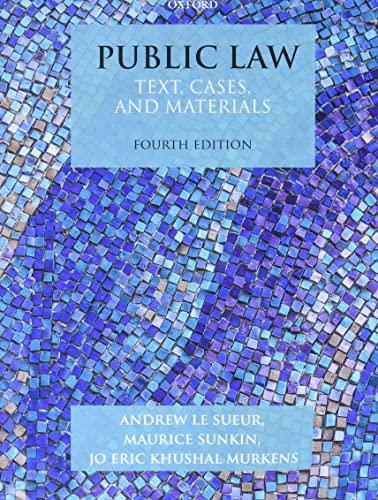Question
1. Why do we still treat the Constitution as binding law today? Consider the following observations from Harvard law professor Michael Klarman: Does the Constitution
1. Why do we still treat the Constitution as binding law today? Consider the following observations from Harvard law professor Michael Klarman:
Does the Constitution deserve our fidelity at all? The answer to that fundamental question seems clear, if counterintuitive: Of course not. ...
The Framers [who wrote and ratified it] are not us. Indeed, in most ways the Framers do not even remotely resemble us, and it is not clear that they have a great deal of relevance to say about how we should govern ourselves today. Consider three sorts of relevant differences: ideological, circumstantial, and background factual assumptions.
The ideological world of the Framers seems light years removed from our own. Most of them thought it acceptable to hold property in human beings (and those who didn't were prepared to compromise the issue). Virtually all of them believed that married women should be treated, in essence, as the property of their husbands....
Consider next the vast differences between the Framers' material circumstances and our own, and how these plainly might have inspired different constitutional commitments. ... A national capital that could not be reached by railroads or telegraph, much less by airplanes and the Internet, was in a very real sense more distant from its citizens than is today's national government. The infant republic played essentially no international role in 1787a circumstance that rendered feasible the creation of a far less robust executive than exists today. The American economy in 1787 was still principally one of subsistence agriculture; there were no national markets and little interstate trade, and thus no necessity for a strong national government empowered to regulate commerce. ...
Finally, the Framers' constitutional handiwork plainly was influenced by various factual assumptions that proved quite wrong in the light of subsequent history. ... [To cite just one example,] the Framers abhorred political partieswhich, almost by definition, devote themselves to partial agendas rather than the common good of the wholeand certainly did not assume they would exist under the Constitution. This assumption was belied almost immediatelya thriving two-party system already had developed by the mid-1790syet it undoubtedly influenced the Framers' suppositions regarding the "distance" it was possible to maintain between national government officials and popular opinion as well as the likelihood of interbranch coordination of purpose.
Given the vast gulf separating them from us, is it clear that the Framers have much of relevance to say about how we should govern ourselves today?
From Michael Klarman, Antifidelity, 70 S. CAL. L. REV. 381, 381- 87 (1997).
2. Are you persuaded by Klarman's provocation? Are there reasons for constitutional fidelity that he fails to consider? If so, which (if any) of these reasons do you find compelling?
3. Given that most Americans do regard the Constitution as binding, does it really matter why we do so? On this point, consider the observations of University of Chicago law professor David Strauss:
These might seem to be the most academic of questions. No one seriously disputes that the Constitution is supreme law, and nearly everyone acknowledges that the views of the Framers matter to some degree. Academic or not, though, these questions are important because throughout constitutional law, the role of text and original understandings remains uncertain. Until we have tried to answer the most fundamental skeptical questionwhy do we care at all about the Framers?we will not know what role the text and the original understandings should play in our contemporary constitutional practice.
From David Strauss, Common Law, Common Ground, and Jefferson's Principle, 112 Yale L.J. 1717, 1717-18 (2003).
In essence, Strauss is arguing that we cannot know how to interpret and apply the Constitution without an explanation for why it continues to bind us (usually known as a theory of constitutional legitimacy). If contemporary judges are bound by the democratic force of the framers' original ratification decision, then the framers' intentions and the original meaning of the text ought to play a largeperhaps, a dispositiverole in contemporary constitutional interpretation. If, on the other hand, the Constitution is binding primarily because it establishes a generally just and workable government, considerations of justice and practical workability might have a larger role to play in defining its meaning. Do you agree, or does Strauss have it backwards? How can we decide whether the Constitution is legitimate before knowing what it means?
Step by Step Solution
There are 3 Steps involved in it
Step: 1

Get Instant Access to Expert-Tailored Solutions
See step-by-step solutions with expert insights and AI powered tools for academic success
Step: 2

Step: 3

Ace Your Homework with AI
Get the answers you need in no time with our AI-driven, step-by-step assistance
Get Started


